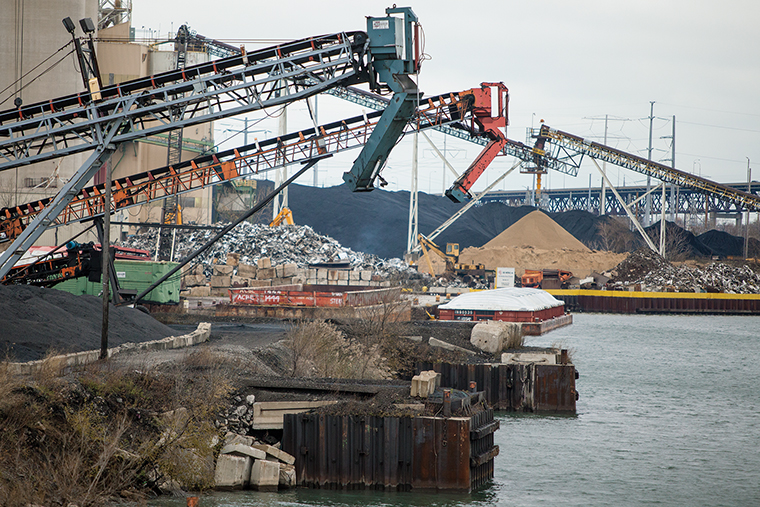Petcoke stockpiles face stricter rules
April 14, 2014
After months of fielding complaints from Southeast Side residents, legislation to regulate petroleum coke, or petcoke—a harmful waste product of oil refineries that is stored along the banks of the Calumet River—finally began to gain traction among city officials. However, a proposed exemption has caused the ordinance to be stalled in a City Council committee.
The Committee on Zoning, Landmarks and Building Standards met April 1 to review the ordinance proposal, at which Alderman John Pope (10th Ward) presented the committee with a revised version that imposes looser restrictions than those outlined in the original draft. The initial proposal—which Pope wrote with Mayor Rahm Emanuel and Alderman Edward Burke (14th Ward)—sought to require KCBX Terminals Co., the company managing the stockpiles, to store petcoke in an enclosed area and prohibit new companies that produce petcoke from opening. Pope’s amended proposal, however, would still allow for these facilities to be established.
The 18-member committee voted to defer the bill until its April 29 meeting, when it will reconsider the proposal. Advocates for the original draft are outraged by the potential revision.
“Rather than preventing an expansion and creating an environment that pushes these piles out, it actually lays out a welcome mat for more petcoke,” said Josh Mogerman, a Natural Resources Defense Council spokesman who was present at the committee meeting. “It really is counter to what this ordinance is supposed to do.”
Pope’s office did not respond to requests for comment on the exemption as of press time.
The ordinance is a response to community complaints that KCBX stores petroleum stockpiles on the Southeast Side along the bank of the Calumet River. Petcoke is a carbon particle derived as a byproduct of the oil refining process. It is normally used as a fuel source in power plants. The open piles emit dust particles that are dangerous to inhale, which discourages residents from venturing outside their homes, as reported Nov. 25, 2013 by The Chronicle.
Mogerman said he thinks Pope included the exemption to allow gasification plants, which produce petroleum coke as byproduct, to set up shop in the city. Gasification plants generate energy by applying steam to organic materials to create a gas substitute known as syngas, said Brian Urbaszewski, director of environmental health programs at the Respiratory Health Association. This gas alternative is appealing because it is inexpensive, but the byproducts are toxic.
“[Residents are] looking at a longer-term goal: getting the clean sustainability industry in their neighborhood to provide good jobs and economic development,” Urbaszewski said. “I don’t think they view petcoke and petroleum refinery leftovers as fitting into their vision of what their neighborhood should be.”
Emanuel announced March 13 that KCBX has two years to enclose all of its petcoke stockpiles.
Facilities must report their enclosure plans to the city within 90 days and will be monitored. They will also be required to enclose petcoke during transportation, install monitors that detect toxic petcoke dust and sweep nearby streets daily.
Southeast Side resident Tom Shepherd said he thinks Emanuel’s regulations will be helpful because piles are currently exposed and admit toxic dust particles, causing health concerns. Shepherd said he spoke with Pope about the exemption and he will not pursue it further.
Inhaling petcoke dust particles can cause asthma attacks, stroke, lung cancer and premature death, Urbaszewski said, adding that these health risks make legal regulations necessary.
Urbaszewski said Chicago is one of the many Midwest cities dealing with excess petcoke. Massive amounts of petcoke are generated when tarzan oil, the thick oil transported from Canada, is converted to gasoline, he said. The oil is becoming more common in the U.S.
“The petcoke amount coming out has tripled,” Urbaszewski said. “A lot more stuff is coming in and the piles are getting higher on the Southeast Side.”
Although Emanuel has imposed regulations, Mogerman said they are not strict enough.
“We’re going to call on the mayor to use his considerable power and influence in the City Council to help make sure we get this thing right,” Mogerman said. “He can do a lot more.”








